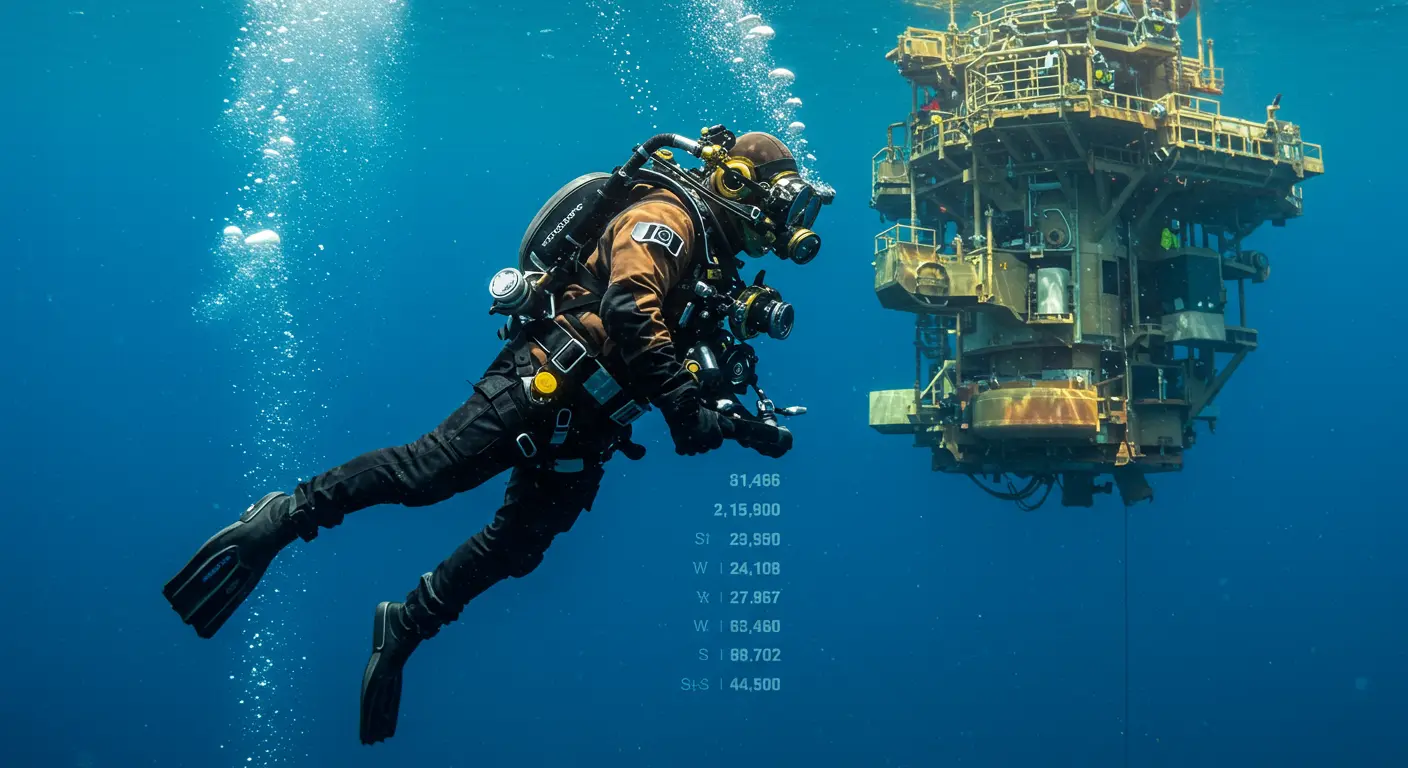One of the riskiest and most specialized positions in the commercial diving sector is saturation diving.
Saturation divers are among the highest paid professionals in the industry because of the significant hazards and difficult working circumstances.

What is Saturation Diving?
Long stretches of time are spent operating at extremely deep ocean depths by saturation divers. They dwell in pressurized chambers on specialized vessels or platforms and are carried to underwater work areas using diving bells. Because fewer decompressions are required, the deep sea activities are much safer and more effective.
Their extremely specific responsibilities frequently consist of:
- Submerged welding
- Oil rig and pipeline maintenance
- Salvage activities (such as retrieving submerged machinery or ships)
- Contributing to scientific studies carried out in the deep sea settings
In the commercial diving sector, saturation divers are regarded as elite experts because to the technical proficiency and physical stamina needed.
Average Earnings of Saturation Divers
Risky and extremely technical nature of their work, saturation divers are among the highest paid professionals in the commercial diving sector. They often make between $80,000 and $120,000 a year, depending on their employment, expertise and credentials. Saturation pay which can range from $1,000 to $1,500 per day during active diving activities is when the major earning surge occurs. For example: a diver can make between $30,000 and $45,000 on top of their usual wage from a single 30-day saturation job.
Certain seasoned divers work at several jobs during the year, earning $180,000 or more in total. Earnings can be greatly impacted by variables such as the type of project, the job location (such as the North Sea or Gulf of Mexico) and the diver’s function (support or lead). Saturation diving is among the most profitable occupations in offshore industry, despite the significant risks involved.
Do Saturation Divers Earn
Factors Affecting Earnings
How much a saturation diver can make depends on a number of important criteria. Experience is one of the most crucial; seasoned divers with a strong record and advanced qualifications usually fetch more compensation. Location is also important; because of the difficult conditions and high demand for qualified divers, areas like the Middle East, North Sea and Gulf of Mexico offer more lucrative contracts. Employer type is also important; larger oil and gas firms or specialist diving contractors can offer greater pay and perks.
The length and frequency of jobs are another consideration; divers can greatly boost their overall revenue by finishing many saturation missions in a single year. Divers who are proficient in underwater welding, inspection or maintenance also typically earn more money. State of the economy in the off shore sector. such as oil prices and the world’s energy consumption, has a direct effect on saturation divers’ employment prospects and income potential.
Job Risks & Why Pay Is High
The reason saturation diving is so lucrative is because it is one of the riskiest occupations in the world. Divers operate at depths much greater than those of ordinary diving occupations, frequently hundreds of feet below the ocean’s surface. These include hypothermia, oxygen toxicity, decompression sickness and equipment failure. Long stretches of time spent in pressurized rooms can also cause mental and physical stress for divers.
At such depths, emergency medical assistance is not always readily available which increases the risk. In addition, 30 day missions can be mentally taxing due to the cramped living arrangements and seclusion. Only people with extensive training and physical fitness are eligible for these positions due to the job’s life threatening nature and technical intricacy. As a result, the high compensation covers not only the labor done but also the risk, preparation and physical stamina needed for saturation diving.
Conclusion:
Within the commercial diving sector, saturation diving is a highly specialized specialty that entails operating for extended periods of time at extremely deep ocean depths. Divers carry out vital activities including underwater welding, pipeline repairs and salvage operations while working in stressful conditions. Saturation divers are among the highest paid professionals due to the unique nature of their employment; when daily saturation pay is taken into consideration, their yearly salaries might surpass $180,000.
Their pay is influenced by a number of criteria, including as experience, location, length of employment, skill set and worldwide energy demands. But there are serious risks along with the impressive income. Divers working in deep sea habitats have to deal with psychological stress, physically taxing circumstances and ongoing risk.
In the end, the high compensation is a reflection of the job’s intricacy and risks. Although saturation diving isn’t for everyone, it may be a demanding and lucrative career path for those who are trained, disciplined and daring.
Q: What does a saturation diver do?
A. saturation diver performs underwater tasks such as welding, inspection, maintenance and salvage operations at great ocean depths while living in a pressurized environment.
Q: Does global demand for oil and gas affect diver pay?
A. Yes. High demand and oil prices typically lead to more projects and better pay for saturation divers.
Q: Why are saturation divers paid so much?
A. The high pay compensates for the extreme danger, required expertise, physical endurance and long periods spent in pressurized chambers under isolated conditions.